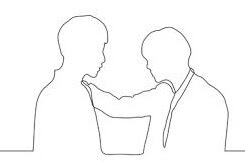Beyond Criticism
(Emotional Management for Personal & Professional Growth Series)


As we discuss the topic of "People Skill at the workplace," let us discuss some of the proven processes to apply when dealing with people.
Last week, we discussed a mature process of criticizing by "beginning your criticism with praise".
I requote the example for quick recall,
Your team presents you with a proposal for a new initiative, and you find that it lacks data, analysis, and proper justification. Instead of scrapping the recommendation by stating it as wasting of time, you can express, “Hi, the intent of new idea and thought process is good, but nowhere the proposal justifies the need for it. The proposal is substandard in its find need to work further on it.”
Compared to bluntly criticizing and hurting others, the method of "beginning criticism with praising" seems to be a better option to some extent. However, there is scope for further improvement.
Do you think that smart and sensitive people would not recognize your sugar-coated way of criticism? People would be happy with your praise till they hear the word “BUT". When people hear the second part of the statement, they become resentful or feel low. Then they may even doubt the genuine of your praise.
I want to indicate that this method of beginning your criticism with praise would not work for smart and sensitive people. If you want to help them realize their mistakes or overcome some of the behaviors, you need to go one step beyond criticism.
The steps beyond criticism are
1) Encourage them and give a feeling that their mistakes can be correctable
2) Show them or demonstrate to them what needs to be done
In the above example,
In addition to the opinion, you can suggest or guide them on what needs to be modified in the proposal. In that way, you demonstrate genuine care for people’s mistakes or behavior, and you are part of them. That will make people take the intention of criticism in the real spirit.
To sum up,
- Criticize gently by beginning the criticism with praise
- Encourage or give a feeling that they can correct the mistakes
- Go beyond by guiding them or demonstrating them.

